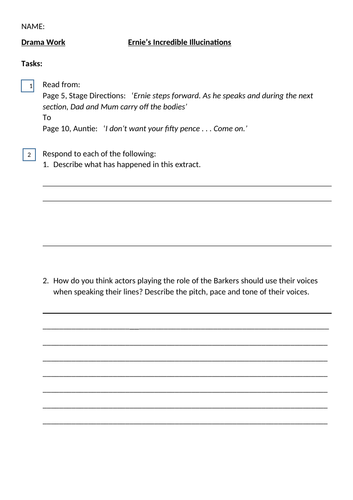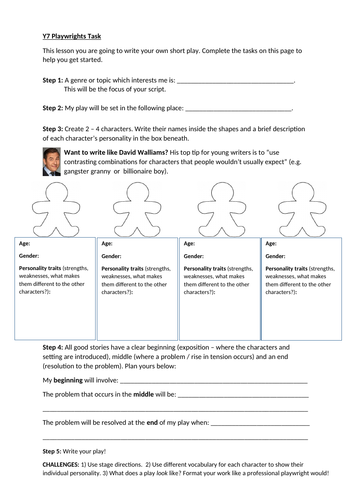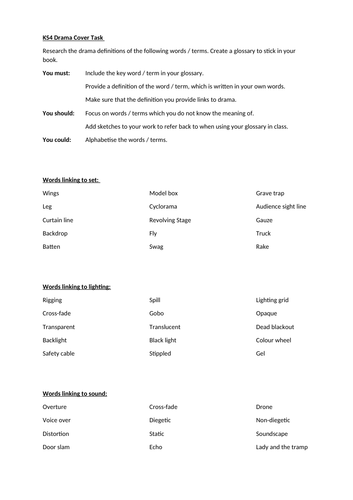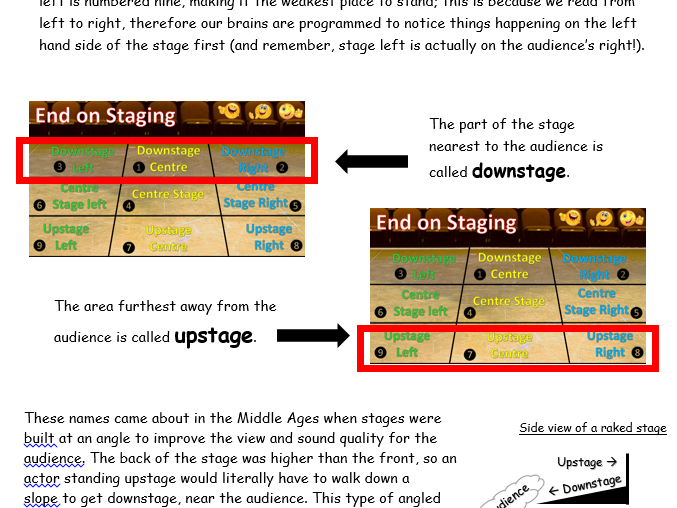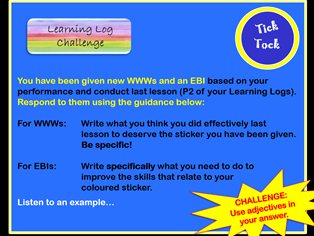
12Uploads
9k+Views
3k+Downloads
Drama

Ernie's Incredible Illucination Cover
Free worksheet for a cover lesson on Alan Ayckbourne’s - Ernie’s Incredible Illucinations.
Suitable for Y7.

KS3 Drama Cover Lesson
Cover lesson task for KS3 drama pupils. The task is scaffolded so that pupils can complete it independently with little to no input from the teacher making it perfect for lessons covered by non-specialists.
Pupils work through simple tasks on the sheet to help them to organise ideas for a play before they write their own script (e.g. ‘A genre or topic that interest me is:’; 'My play will be set in the following place: '; etc). This could be completed over more than one lesson to allow pupils to develop their writing and create longer scripts. They could then work practically to create scenes of scripted drama using their own or each other’s work.
Pupil ownership / engagement:
Top writing tip from David Walliams’ radio talk with Chris Evans on BBC Radio 2 (paraphrased)
Scope for pupils to write about whatever genre, topic, characters, setting etc that interests them
**Challenges: **
Use stage directions.
Use different vocabulary for each character to show their individual personalities.
What does a play look like? Format your work like a professional playwright would!
**Resources required: **
Pens / pencils, paper or workbooks, the worksheet provided
OR
Computers / laptops for pupils to type their work & the worksheet provided (alternatively it could be emailed to pupils to save trees… we all <3 trees!)

Drama Cover Work for KS4
Research task appropriate for a cover lesson for high ability KS3 or for KS4 drama. A simple but beneficial task which pupils should be able to complete independently if taught by non-specialists.
Resources required: Computers, pens / pencils, paper or work books (or pupils could type their work up).
**Task: **
Pupils will research a number of key words and terms which link to various elements of theatrical design and create a glossary to use as a learning reference tool in future lessons or for revision.
Design elements included: Set, sound, lighting, costume, hair, make-up.
Total of 57 words/terms provided!
Learning Objectives:
You must: Include the key word / term in your glossary.
Provide a definition of the word / term, which is written in your own words.
Make sure that the definition you provide links to drama.
You should: Focus on words / terms which you do not know the meaning of.
Add sketches to your work to refer back to when using your glossary in class.
You could: Alphabetise the words / terms.
**Extension task: **
Create a key and colour code the words / terms to show which areas of theatrical design they link to.
Pupil Ownership / Engagement:
Pupils select the words which they wish to research. Words are divided into elements of theatrical design to help them to identify words linking to areas of interest.
A few intriguing / funny sounding words and terms provided to hook pupils in
Cross-curricular links:
Science: Vocabulary for describing transparency of materials
Music: Vocabulary for describing sound
Art: Vocabulary for describing make-up tone and effects. Drawing task included
Media studies: Vocabulary for describing different types of sound effects
English … obviously!

Y7 / KS3 Drama Worksheet - Describing Vocal Skills
Worksheet requiring pupils to analyse and describe the use of vocal skills by a comedy actor in a video clip.
3 questions, visual prompts and a list of key words provided.
Suitable for use as a homework sheet, as catch up for pupils who have missed introductory lessons on exploring vocal skills, as starter / plenary task, or as part of a cover lesson.
I use this with Y7s in their first few weeks of term.
Images of the worksheet have been altered to prevent printscreening. The sheet that you will download will not have grey clouds on it!

KS3 Drama Cover Worksheet on Staging
Worksheet suitable for KS3 drama pupils. Ideal for cover work, homework or catch up work for pupils who have missed introductory lessons to proscenium arch and end on staging.
The 5 page worksheet includes:
Starter task
Learning objective
Success criteria
Images to support comprehension
Reading task on staging positions (strengths, names, history on raked staging)
5 questions, with space to respond after each of them, for pupils to demonstrate comprehension of learned theory
Written plenary task to lead into future lessons on staging styles
Dyslexia friendly (worksheet is in size 12 Comic Sans font)
Images in the worksheet are taken from a PowerPoint I created for teaching different staging styles. I am hoping to finish making another worksheet soon which will cover traverse, promenade, arena and thrust staging.

Drama Practitioners Card Sort for Remote or Classroom Learning
A card sort activity suitable for classroom learning, or adaptable for remote learning. The 19 cards are based on events in the lives of drama practitioners Brecht, Artaud, and Stanislavski. They also feature a few other notable milestones in history and drama history to provide context to the information presented. The activity is based on metacognition and can be used as a tool for cross-curricular learning (E.G: History - World wars; Maths - calculating ages & dates; PSHRE - morals and ethics; Geography - birth/death places of practitioners).
Two copies of the card sort are provided - a teacher’s copy (cards are in the correct order), and a copy for pupils (cards are jumbled). Pupils should sort the cards into chronological order. They can then consider/discuss how the events may have influenced the development of each practitioner’s style.
A tried and tested resource! I’ve use this with multiple KS4 classes and have found it to be a great starter activity after teaching modules on each of the practitioners. I’ve also used it to introduce one of the practitioners after teaching modules on the other two. All groups I have used this with have found it engaging, and it has proven to be a great conversation starter. More able learners usually complete the card sort in around 5-8 minutes, but discussions around the facts could last for as long as you allow!
Feedback on the resource would be greatly appreciated :)

Drama Cover or Starter - Drama Scategories Game
Drama activity for KS4 pupils, or HA Y9s based on the board game ‘Scategories’. Ideal for classroom based cover lessons and suitable for non-specialists to deliver. NO PRINTING NECESSARY! Pupils will just need a whiteboard, or a pen/pencil and paper each.
I have shortened this task and used this as a starter task for writing lessons in drama with KS4 to get them thinking about and discussing key vocabulary prior to doing exam-style question practice. Makes for a nice, ‘fun’ starter before the serious work begins!
The resource includes:
1 x PowerPoint (see info below)
1 x Word document with category cards to print (optional)
The powerpoint includes pupil friendly written instructions, additional notes for the teacher, timers embedded into the slides for effective time management, example of how to play the game, 5 game cards (each with 10 drama themes/‘categories’ on them), and 10 extra slides with different letters on them so that the activity can be extended to produce different responses from pupils (using the original 5 game cards).
Each ‘letter’ slide is duplicated to support your preferred delivery method (i.e. using printed game cards / displaying them on the PowerPoint / swapping game cards on to slides with different letters).
Dyslexia friendly resource (Comic Sans font).
Grey clouds used in example images to prevent printscreening - these will not appear in the files that you download.
Have fun!

Stephen Lawrence Inquiry: Devised Drama
6 PowerPoint lesson plans complete with starters, learning objectives, success criteria, lesson tasks and plenaries for each lesson. The topic is suitable for Y9 and is based on devising around the Stephen Lawrence Inquiry. SOW explores themes of gang culture, knife crime, racism and media. Work links to PSHRE, media studies and exploration of naturalistic, Brechtian and surreal drama. Perfect for use with The Colour of Justice by Richard Norton-Taylor.
The worksheet allows for written evaluations after each lesson as well as an evaluation of how skills have been developed throughout the topic. It is based on the theory of metacognition and uses colour coded feedback through use of coloured stickers to speed up marking.

